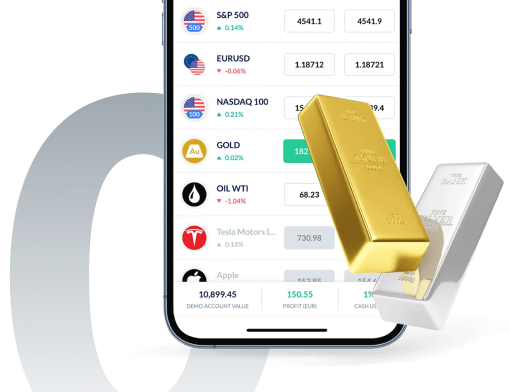What would the world look like if everyone were debt-free? It would be like a dream, right? As much as that would be an ideal situation, the reality is that many of us borrow money at some point in our lives. While most people perceive it as a negative concept, it can provide enormous benefits if utilised wisely. For traders, debt is an essential tool to finance investments and take advantage of market opportunities as you'll learn shortly below.
Trade Demo: Real trading conditions with zero risk
Trade risk-free on Skilling’s award winning platforms with a 10k* demo account.

What is debt?
Debt simply refers to money borrowed by an individual, business, or government entity from a lender with the agreement to repay the borrowed amount along with interest within a specified timeframe. It is a form of financial obligation that allows individuals or organisations to access funds for various purposes such as investments, purchases, or operational expenses. Debt can take the form of loans, credit cards, mortgages, bonds, or other forms of financial instruments.
Why is debt important for traders?
For traders debt is an essential tool to increase their exposure to the market. This tool is called leverage.
Leverage provides traders with the ability to increase their buying power in the financial markets. The greater the leverage, the more significant the exposure to the market. For example, a trader with $10,000 of capital can open a position worth $100,000 by using 10:1 leverage. This increases the potential profit if the trade is successful. However, it is essential to note that the losses are also magnified in the same way. Too much leverage can lead to margin calls, which means a trader must add more funds to their account to maintain their position.
Here's another example of how debt and leverage are used in Forex trading.
Forex trading is one of the most common markets in which traders use debt and leverage. For example, a trader wishes to buy 100,000 EUR/USD at a rate of 1.2000. Without leverage, the trader would need $120,000 to buy these euros. However, with leverage of 100:1, the trader only needs to invest $1,000 and borrow the remaining $119,000 from the broker. If the trader sells the euros later at a higher rate, they will make a profit, magnified by the leverage used. However, if the trade moves against them, they will make a loss, which will also be magnified by the leverage.
Another advantage of leverage in trading is, traders can diversify their portfolios and invest in various financial instruments such as commodities, stocks, cryptos, Forex, and indices. This allows traders to spread their risk, as not all investments will perform well simultaneously. By doing this, they can decrease their exposure to any one market or asset class, which is one of the fundamental principles of investment management.
Conclusion
Before using debt and leverage as a trader, you should take the time to educate yourself on the risks and benefits of using these tools. Traders should also have a good understanding of the markets they are trading in, as well as the various financial instruments they are using. Additionally, traders should have experience in the market and have a solid understanding of risk management. This will enable them to make informed decisions and manage the risks associated with debt and leverage.
While using leverage may be confusing for some at first, it's important you practise using it with a demo account first before risking your real money. Try using Skilling's demo account with $10000 in virtual funds and have access to over 1200 CFD instruments including cryptos, Forex, stocks, etc. that you can practise leverage with without risking any real money.
What's your Trading Style?
No matter the playing field, knowing your style is the first step to success.

FAQs
1. Why is understanding debt important for traders?
Understanding debt allows traders to make informed financial decisions related to borrowing, leveraging, and managing risk. It also helps them assess the financial health of companies they invest in and determine potential growth opportunities.
2. How can traders use leverage in their trading activities?
Traders can use leverage by borrowing funds from their brokers to increase their market exposure. This allows them to control larger positions in the market with a smaller initial investment, potentially magnifying profits. However, it also increases the potential for losses.
3. What are the risks associated with using leverage/debt in trading?
Using leverage involves a higher level of risk. While it could amplify profits, it could also lead to substantial losses. Traders should carefully manage their leverage levels, set stop-loss orders, and be prepared for market volatility.
4. How can traders determine an appropriate level of leverage for their trades?
Determining an appropriate level of leverage depends on various factors, including risk tolerance, trading strategy, and market conditions. Traders should conduct thorough research, develop a clear risk management plan, and consider the potential impact of leverage on their positions.
5. Are there any regulations or restrictions on leverage in trading?
Yes, different countries and regulatory bodies have varying regulations and restrictions on leverage in trading. It's important for traders to be aware of and comply with the applicable rules and restrictions in their jurisdiction.
6. Can traders trade on margin without using leverage?
Yes, traders can trade on margin without necessarily using leverage. Margin trading allows traders to borrow funds to finance their trades, but they can choose not to utilise the maximum leverage available and maintain a lower level of risk.











